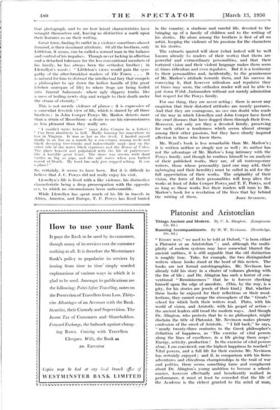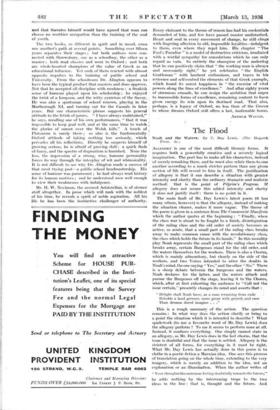Platonist and Aristotelian
Running Accompaniments. By H. W. Nevinson. (Routledge. 10s. 6d.) " EVERY MAN," we used to be told at Oxford, " is born either a Platonist or an Aristotelian " ; and, although the multi- plicity of modern systems may have somewhat blurred the ancient outlines, it is still arguable that the old distinction is roughly true. Take, for example, the two distinguished writers whose books stand at the head of this review. The books are not formal autobiographies. Mr. Nevinson has already told his story in a cluster of volumes glowing with the fire of life ; and Dr. Alington has such a horror of con- ventional " Reminiscences " that he is forever checking himself upon the edge of anecdote. (This, by the way, is a pity, for his stories are jewels of their kind.) But, whether these books be enjoyed for their reflections or their--recol- lections, they cannot escape the atmosphere of the " Greats " school for which both their writers read. Plato, with his world of vision, and Aristotle, with his goSpel of action— the ancient leaders still tread the modem ways. And though Dr. Alington, who protests that he is no philosopher, might disclaim the title of Platonist, Mr. Nevinson makes plenary confession of the creed of Aristotle. " I fall back," he says, " nearly twenty-three centuries to the Greek philosopher's definition of happiness, as ` The exercise of vital powers along the lines of excellence, in a life giving them scope.' Energy, activity, production ! In the exercise of vital powers alone, I am convinced, can the highest happiness be reached." Vital powers, and a full life for their exercise Mr. Nevinson has certainly enjoyed ; and if, in comparison with his fierce adventures and chivalrous championships in the trail of war and politics, there seems something tame and complacent about Dr. Alington's young ambition to become a school- master, however effectually and beneficently realised in performance, it must at least be conceded that the life of the Academe is the richest granted to the mind of man, and that Socrates himself would have agreed that man can choose no worthier occupation than the training of the soul of youth.
The two books, so different in spirit and in mood, cross one another's path at several points. Something over fifteen years separates their stages ; but both authors were con- nected with Shrewsbury, one as a schoolboy, the other as a master ; both read classics and went to Oxford ; and both are whole-hearted champions of the value of Greek as an educational influence. Yet each of them reacted with almost opposite impulses to the training of public school and University. From the schoolroom Dr. Alington_ appears to have been the typical product that masters and dons approve. Not that he accepted all discipline with meekness ; a freakish sense of humour played upon his scholarship ; he enjoyed the twist of a lampoon, and the witty cynicism of the Savoy. He was also a sportsman of school renown, playing in the Marlborough XI, and turning out for the Casuals in later years. But one characteristic • phrase suggests his general attitude to the fetish of games. " I have always maintained," he says, recalling one of his own performances, " that it was impossible to keep goal well, and at the same time to watch the glories of sunset over the Welsh hills." A touch of , Platonism is surely there ; so also , is the fundamentally Oxford attitude of taking nothing too seriously, which pervades all his reflections. Directly he suspects himself of . growing serious, he is afraid of proving dull ; a quick flash .; of fancy, and the spectre of dogmatism is banished. None the less, the impression of a strong, wise, humane personality forces its way through the interplay of wit and whimsicality. It is not difficult to see why Dr. Alington made a success of that most trying post—a public school headmastership. His sense of humour was paramount ; he had always read history for its human motives ; and he understood men well enough to view their weaknesses with indulgence.
Mr. H. W. Nevinson, the avowed Aristotelian, is of sterner stuff altogether. In prose which will rank with the noblest of his time, he reveals a spirit of noble aspiration. All his life he has been the instinctive challenger of authority. Every claimant to the throne of reason has had his credentials demanded of him, and few have passed muster undisturbed. Heart and soul in every movement of change, he still clings with lingering affection to old, impossible loyalties—indulgent to them, even where they repel him. His chapter " The Fool's Paradise " is a model of destructive Criticism, irradiated with a wistful sympathy for consolations which he can only regard as vain. So entirely the champion of the underdog that he can positively claim that " the working man is always and necessarily right," he yet celebrates " the English Gentleman " with lambent enthusiasm, and traces in his reticence and self-control the elements of that Greek example, which found its surest happiness in " the exercise of vital powers along the lines of excellence." And after eighty years of strenuous crusade, he can resign the ambition that urges to inaccessible forms of excellence, remaining content to have given energy its rein upon its destined road. That also, perhaps, is a legacy of Oxford, no less than of the Greece to whose dreams Oxford still offers a last, inalienable home.
ARTHUR WAUG II.















































 Previous page
Previous page